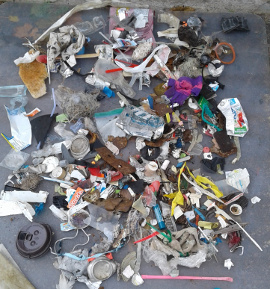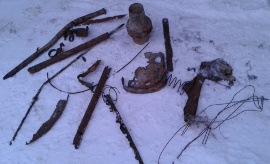Stephen Vance, Staff
 Meaford resident Karl Braeker has been spending a significant amount of time collecting trash that washes up on the shore of the small beach at David Johnston Park, adjacent to the Coast Guard Station, and he brought his concerns to council.
Meaford resident Karl Braeker has been spending a significant amount of time collecting trash that washes up on the shore of the small beach at David Johnston Park, adjacent to the Coast Guard Station, and he brought his concerns to council.
At council’s January 15 meeting Braeker made a presentation during which he showed photographs of the large amount of trash he had been collecting each month; he also offered some theories as to why this particular stretch of beach seems to be a magnet for trash.
“I have been walking this particular beach with my dog since the fall of 2015. I have enjoyed this beautiful spot from day one, but have been increasingly dismayed about the garbage washing in from Nottawasaga Bay,” Braeker told council. “I collected the most obvious pieces of garbage flotsam and deposited them in municipal waste containers in the Meaford Harbour confines during 2016 and prior to July of 2017. Concern grew into almost despair, since I assumed that this flotsam was an indication of the pollution in Georgian Bay.”
Beginning in July of last year Braeker started paying more attention to the amount and type of trash washing up on the beach, and he took photos of his monthly collection of trash.
“I started a systematic collection of all human-created flotsam on this beach, treating the beach as an active crime scene as I would have in my previous profession as a police officer,” Braeker told council. “Once this flotsam is collected it can undergo forensic examination which will tell us about origin, composition, age, and possible sources.”
While he’s been collecting and documenting the trash collected, Braeker has also been contacting various government agencies to raise awareness about the issue, and he’s been frustrated by the lack of response as well as the lack of interaction between government agencies.
Braeker noted that his inspections of other beaches in the municipality haven’t uncovered the amount of trash washing up at David Johnston Park, and he suspects that traditional water currents have turned the beach into a magnet for floating trash.
“In October 2017 I extended my daily beach walks to beaches east and west of Meaford Harbour and the David Johnson Beach, but to my immense relief found that these beaches were almost clean in comparison to the David Johnston Park beach,” he told council. “A walk around the harbour in late October became one of my eureka moments. The harbour walls are smooth all around, except for the breakwater dividing harbour and boat slips. From the Harbour Master House, the harbour edge is formed by big rocks, and in the corner where the smooth wall changes to rocks, the Bighead River current creates a small eddy, where flotsam collects for a while, before re-joining the current. This eddy is actually a bellwether of what comes down the Bighead River and from the harbour.”
Braeker suggests that the current exiting the harbour in a westerly direction meets a stronger current which then directs the trash to the David Johnston Park beach.
“What I have observed before, and again at this time, is that the current exiting the harbour in a westerly direction meets a stronger current coming from the direction of the tank range and takes the Bighead current past the lighthouse, where incoming waves from the open Nottawasaga Bay drive the flotsam onto David Johnston Beach,” he told council.
 While much of the trash he has collected has included soda bottles, coffee cups, and other modern waste, Braeker said that some of what he’s found is clearly from decades ago.
While much of the trash he has collected has included soda bottles, coffee cups, and other modern waste, Braeker said that some of what he’s found is clearly from decades ago.
“Besides the garbage created in recent years by our throw-away society, there have been some items washed up on the beach that are obviously from a much earlier era,” he told council. “I have no way of knowing for certain, but there has been extensive industrial activity in this area, which might account for the older stuff, but there is also the old Meaford Dump up-river, and it was close to the Bighead River, as reported in the 1988 Grey County Waste Management Study by R. Cave and Associates Ltd, Consulting Engineers.”
In addition to raising awareness with council about the issue of trash washing up on the David Johnston Park beach, Braeker said that he will continue his inspections and collection of trash in the spring, and he is hoping that local government agencies will be moved to take some action.
“Having kayaked the Beaver River several times over the last four decades, I am aware that the riverbed can and will change direction from year to year. It will be interesting in the spring to investigate if the Bighead River has changed direction since 1988 and is now mining the old Meaford dump, carrying some of its contents to the David Johnston Beach,” he told council. “I also contacted the Grey-Sauble Conservation Authority asking for their position on the flotsam/garbage problem, but was advised that their mandate was restricted to Floods and Forests. I was, however, encouraged to bring it to the attention of Meaford Town Council.”
Braeker said that from his observations there are three distinct types of flotsam washing up on the beach – natural flotsam including driftwood and other organic materials, historical items including objects made from metal, glass, and wood, and modern trash including fast food containers, plastic bags, and other man-made materials.
Braeker is calling on government agencies at all levels to work together to find a solution to the problem.
“We cannot isolate ourselves in separate silos and expect matters to improve. It is imperative that all levels of government and we, as citizens, accept that there is a problem and that it can only be solved by working together and putting the public interest as a priority,” he told council.











